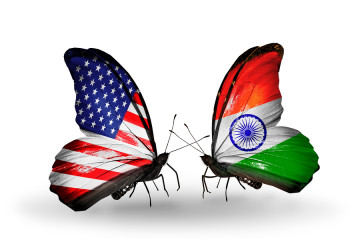Modi’s Israel Visit Said to Spur Missile Deals as Ties Deepen

published Apr 11th 2017, 4:00 pm, by N. C. Bipindra
(Bloomberg) —
India is close to signing two defense deals with Israel as it seeks to deepen ties with the Middle Eastern nation before Prime Minister Narendra Modi’s visit in July, according to people with knowledge of the matter.
The deals include anti-tank missiles and a naval air defense weapon system, the people said, asking not to be identified given the information is private. Still, the plan for the first trip to Israel by an Indian prime minister indicates that cooperation goes beyond Delhi’s status as the largest buyer of Israeli military hardware.
“The visit is a big milestone,” said Shailesh Kumar, senior Asia analyst at political risk firm Eurasia Group. “Officials in both countries believe they face a common external threat: terrorism. Working with Israel fits into Modi’s bigger pivot of deeper relations with the U.S. given the U.S.-Israel friendship.”
The deals for Spike anti-tank missiles for India’s army and Barak-8 air defense missiles for its navy are expected to be finalized in the next two months, the people said. The pacts are worth $1.5 billion, they said, and will see the delivery of the 8,000 missiles will begin two years after the contracts are signed.
They’re part of Modi’s $250-billion plan to modernize the armed forces by 2025 amid tensions with neighbors China and Pakistan.
The purchase of Spike missiles was approved by India’s Defence Acquisition Council in October 2014 and the Barak-8 purchase proposal was given the go-ahead in a meeting on April 3 this year, the people said. Defence Ministry spokesman Nitin Wakankar declined to comment on the deals.
Israel was the third-largest arms supplier to India in the three fiscal years ending March 2016, having bagged 10 deals worth a total of 76 billion rupees ($1 billion), according to an Indian parliament report. Only the U.S. and Russia have made more defense deals with India during the period.
“India-Israel ties have always been strong but never have they been widely publicized,” said Ankur Gupta, New Delhi-based vice-president for Aerospace and Defence at Ernst & Young. “There is great strength and value in this relationship as Israel is one of India’s foremost supplier of weapons and related high-end technology.”
Since Modi came to power in May 2014, his government has shed his predecessors’ reservations on talking about India’s ties with Israel.
“India is gradually disengaging itself from its traditional and ideological foreign policy approach in the Middle East,” said Alvite Singh Ningthoujam, a senior research associate at the Vivekananda International Foundation.
“It is also a clear message that India does not anymore have qualms in getting closer to Israel, and is wielding an independent foreign policy and not at the cost of its relations with any other countries in the region.”
Billion Dollar Deal
The missile deals follow transactions finalized last week for India to obtain medium- and long-range surface-to-air missiles worth $2 billion.
The medium-range missile was developed for the Indian Army by IAI and India’s Defence Research and Development Organisation in collaboration with Israel’s RAFAEL and IAI/Elta, and included Indian companies like Bharat Electronics Ltd, Bharat Dynamics Ltd and Larsen & Toubro.
Both deals form part of Modi’s ‘Make in India’ program, designed to stimulate local production.
“These missile systems are key to adding to our strategic defense capabilities against platforms owned by our neighbors” including anti-ship missiles, cruise missiles, armed drones and modern fighter aircraft, said Anurag Garg, aerospace director at Strategy&, a PriceWaterhouse Coopers consultancy.
–With assistance from Iain Marlow.To contact the reporter on this story: N. C. Bipindra in New Delhi at nbipindra@bloomberg.net To contact the editors responsible for this story: Ruth Pollard at rpollard2@bloomberg.net Rosalind Mathieson
COPYRIGHT
© 2017 Bloomberg L.P





No Comment